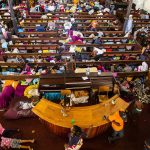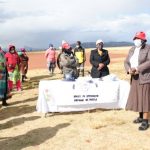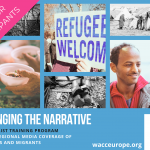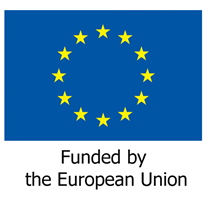 Pretoria, 30 August 2021 – The International Organization for Migration (IOM), with funding from the Southern African Migration Management (SAMM) project, funded by the European Union, convenes Government officials from the 16 countries of the Southern African Development Community (SADC), for a capacity building workshop on migration data management in Southern Africa.
Pretoria, 30 August 2021 – The International Organization for Migration (IOM), with funding from the Southern African Migration Management (SAMM) project, funded by the European Union, convenes Government officials from the 16 countries of the Southern African Development Community (SADC), for a capacity building workshop on migration data management in Southern Africa.
The overall objective of this Regional Training Workshop is to contribute to enhancing the capacities of statistical officials and relevant stakeholders with migration-related functions and responsibilities to improve migration data management systems in accordance with international and regional instruments within the broader context of the Objective 1 of the GCM and SDGs and the specific context of the Southern Africa Migration Management (SAMM) project. The EU-funded SAMM project recognizes the need to strengthen regional and national capacities for data collection, production of reliable migration statistics, and coordinated information-sharing mechanisms in order to improve the availability of and harmonization of migration data in the region.
Despite the high volume of population mobility and migrant stocks in the Southern African region, data on international migration is often unavailable, or fragmented and non-comparable between countries. This hampers the capacity of relevant stakeholders to design and develop evidence-based migration policies which affects the accuracy of national and regional reports on policy and development progress.
The need for timely and reliable data to inform migration policies and programming within SADC was underscored by the recommendations from the 2017 and 2019 Ministerial meetings held in the margins of the Migration Dialogue for Southern Africa (MIDSA) held in Eswatini and Namibia respectively, which among others, encouraged the member states with the support of IOM in coordination with relevant partners to build capacities to collect and analyse migration-related data to develop policies based on evidence and data to improve migration governance at the national and regional level.
Similarly, efforts to prioritize the improvement of migration data are corroborated at the global level by the Global Compact for Safe, Orderly and Regular Migration (GCM), which states the need to “Collect and utilize accurate and disaggregated data as a basis for evidence-based policies” as its first objective.
The outcome of the training is to Increase awareness of the importance of international migration data policies and share good practices; strengthen the capacity of key staff of the national institutions managing migration on the comprehension of migration data collection and analysis; enhance the understanding of the uses and limitations of migration data for policy purposes; assess the outcomes of the regional exercise to tabulate migration-related data collected from national censuses; and Facilitate coordination across NSOs in the region in finding a better working relation to ensure comparability of data, uniformity of methodology and indicators for a robust, reliable and valid regional level assessment of migration data and statistics to inform policy.
The SAMM Project supports the Regional Economic Commissions (RECs) in the Southern Africa and Indian Ocean Region and the Member States to improve the management of migration. In the area of data collection and management, the Project seeks to strengthen the technical and financial capacity of the National Statistical Officials and other relevant stakeholders to capture, store and manage harmonized cross-border data on mixed migration flows, support the development of a mechanism and standardized procedures to collect and process migration-relevant data as well as the analysis and dissemination of such data.
-END-
 Português
Português







